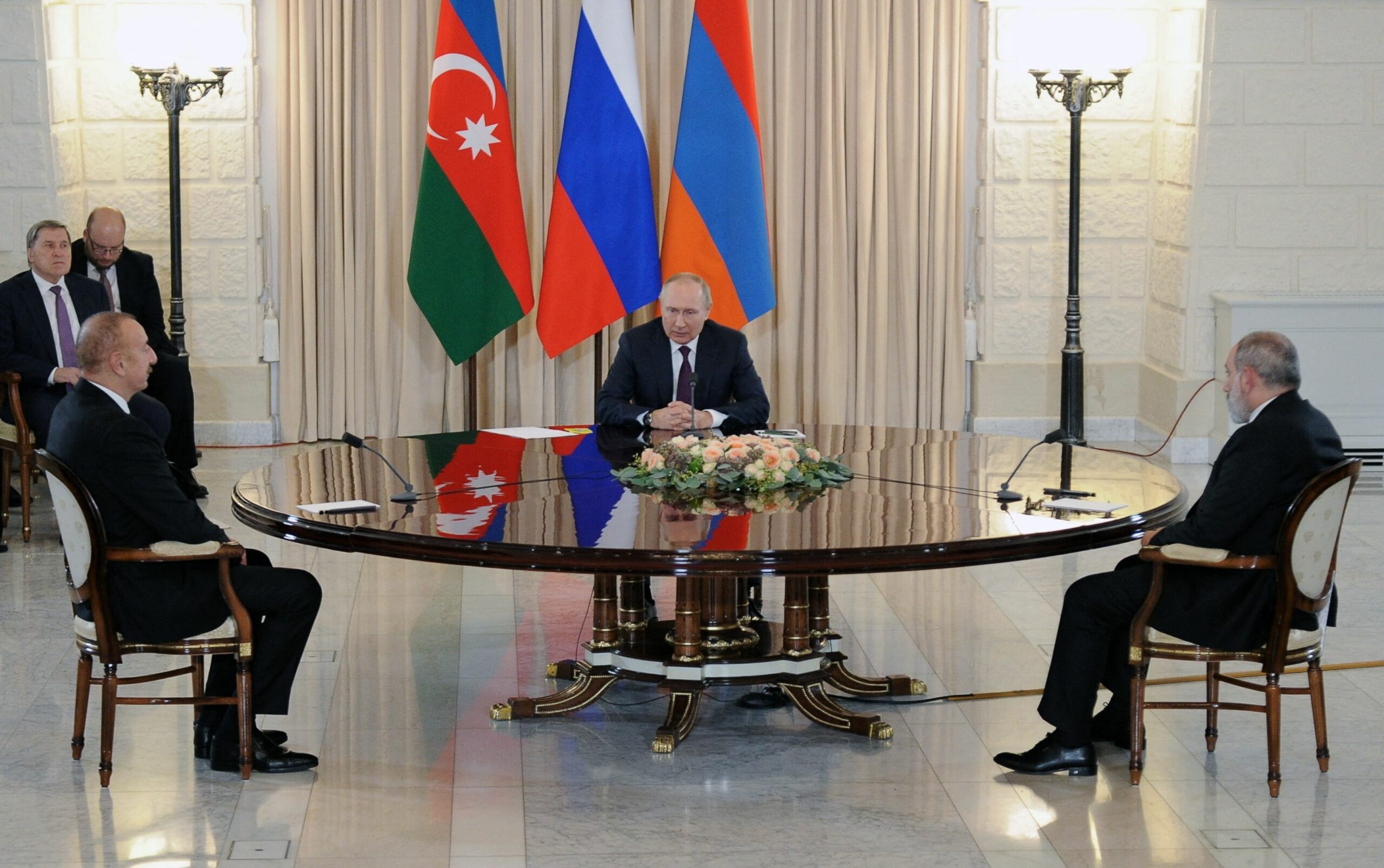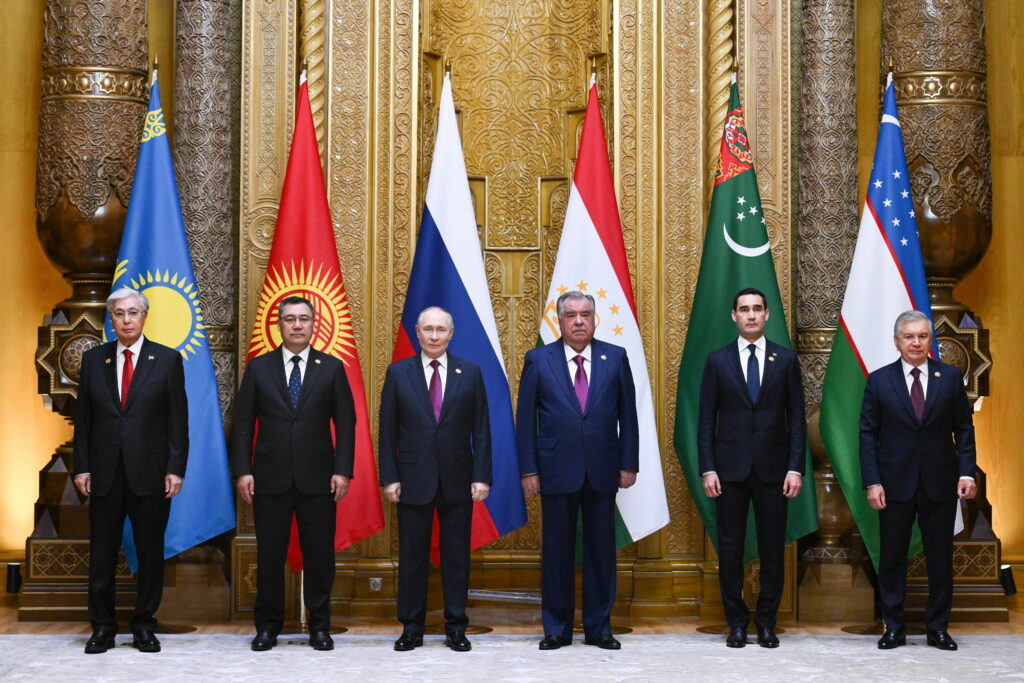The acute crisis in Russia’s relations with Azerbaijan and the simmering one with Armenia highlight the approach the Kremlin increasingly employs in dealing with its closest neighbors. When a traditionally loyal post-Soviet state begins to drift away from Moscow, the response is not aggression but rather ignoring the issue, downplaying the problem, and signaling that the situation is supposedly under control. In the Russian leadership, they likely believe that this behavior helps maintain influence not on a tactical but on a strategic level. However, it’s hard to say that this approach has led to success anywhere so far.
Smiling and Enduring
After the visits of Armenian Prime Minister Nikol Pashinyan and Azerbaijani President Ilham Aliyev to Washington, where a peace treaty was initialed at the White House, only the lazy have refrained from commenting on Russia’s final ousting from the South Caucasus. The situation does indeed look dramatic: the «Zangezur Corridor,» through which Moscow was supposed to establish railway connections with Iran and Turkey, has now been dubbed the «Trump Road.» Instead of Russian border guards, as stipulated in the agreement following the Second Karabakh War, control over it will pass to an American-Armenian consortium, the composition of which is yet to be determined.
One might expect such news to provoke a strong reaction in Moscow—summoning the Armenian ambassador for a dressing-down or a statement from Sergey Lavrov about «Yerevan’s cynical violation of allied obligations.» Yet, instead, Deputy Prime Minister Alexey Overchuk made a paradoxical statement: «Armenia is our strategic ally, and if Armenia believes something is good for them, then, of course, we support Armenia.» Hearing this from Overchuk is surprising, as he has been involved in the trilateral commission (Russia-Armenia-Azerbaijan) on «unblocking communications» in the region since January 2021 and knows better than anyone the goals Moscow was pursuing.
Moscow’s rhetoric toward Baku is equally puzzling. While Azerbaijani authorities continue to detain Russian citizens, including employees of the state-run Sputnik news agency, and publicly discuss the possibility of lifting the embargo on ammunition supplies to Ukraine, Vladimir Putin publicly congratulated the wife of the Azerbaijani president and the country’s first vice-president, Mehriban Aliyeva, on her birthday. «Please convey my greetings to Ilham Heydarovich and all members of your family,» he added.
If someone less prominent than Putin had done this, Russian Z-propagandists would have immediately branded such a gesture as «national cuckoldry.» And that would be logical: on the same day, August 22, political scientist Sergey Markov, known for his loyalty to the authorities, was declared a foreign agent—likely for excessive and untimely sycophancy toward Ilham Aliyev. There are many such logical inconsistencies: while propagandists compete in witty attacks against Armenia and Azerbaijan, officials insist that Russia retains influence in the region, citing a series of major economic projects as evidence.
Strategic Silence
The history of Russia’s relations with post-Soviet countries, including the South Caucasus, is full of varied responses to provocations against Moscow. At times, scandals erupted over nothing. For example, shortly after coming to power, Nikol Pashinyan decided to remove Armenia’s representative to the Collective Security Treaty Organization (CSTO), Yuri Khachaturov, from his post as secretary-general. This move had no anti-Russian intent: Pashinyan was settling scores with a long-time opponent who was also involved in the brutal suppression of protests—the harshest in independent Armenia’s history. However, Moscow saw it as an attempt to tarnish the CSTO, a military bloc created as a counterweight to NATO. The situation was exacerbated by Alexander Lukashenko’s involvement: in alphabetical order, Belarus follows Armenia, and Minsk decided that if Khachaturov was removed, the right to appoint a new secretary-general should pass to Belarus, not remain with Armenia, even though Khachaturov had only served half of his CSTO term. The position of CSTO secretary-general is so insignificant that it was illogical to make a serious dispute out of it. But apparently, the parties needed to vent their emotions at the time.
At other times, Moscow would escalate tensions before a neighbor’s significant move, hinting that it could take serious offense. However, when the undesirable step occurred, Russia would act as if it wasn’t that important. A clear example involving Armenia is the ratification of the Rome Statute. Yerevan needed it to counter Azerbaijan, but theoretically, it allows for Putin’s arrest during a visit to Yerevan, as Armenia now recognizes the jurisdiction of the International Criminal Court, which issued a warrant. Before the parliamentary vote, Moscow called the decision «extremely hostile,» but after its adoption, it was merely «incorrect.» Since then, Moscow-Yerevan relations have deteriorated, but not because of the statute’s ratification, rather due to more significant reasons, including the exodus (expulsion) of Armenians from Karabakh and subsequent events.
Sometimes, actions by a partner that clearly contradicted Moscow’s strategic goals were simply ignored. Speaking of Karabakh, one should recall the blockade of the region by «environmental activists,» the establishment of a state border post, the military operation in September 2023, and finally, the early withdrawal of Russian peacekeepers. Together, these events shattered Moscow’s plans, which saw Karabakh as a new outpost of its influence for years to come and an opportunity to emphasize its role as a peacemaker who «doesn’t start wars but ends them.» However, things turned out differently, and now Moscow’s influence in the South Caucasus is in question: it seems to exist in some form, but it’s increasingly hard to discern.
Some, however, see Moscow’s silence not as a sign of weakness but as a strategic calculation. The idea, presumably, is to avoid scandals and consistently pursue its policy. According to this logic, once Moscow achieves its goals in Ukraine (whatever they may be), the Kremlin will return to the positions it temporarily retreated from. There are arguments supporting the existence of such a calculation, but its effectiveness remains questionable.
Waiting Out Trump
No matter how comfortable Donald Trump’s rhetoric on Ukraine may be for the Kremlin («if Zelensky doesn’t agree to stop the war now, he risks losing everything»), his ambition to claim credit for resolving the Armenia-Azerbaijan conflict, especially with the prospect of American control over the transport corridor connecting them, cannot but worry Russian authorities.
Yet, official statements from Russian authorities on this matter remain restrained. Even Maria Zakharova, usually sharp in her remarks, was no exception. «The meeting of the leaders of the South Caucasian republics in Washington, mediated by the American side, deserves a positive assessment. We hope this step will contribute to advancing the peace agenda,» she said. However, Zakharova couldn’t resist adding a couple of phrases with an offended tone, emphasizing that «the current stage of Armenian-Azerbaijani normalization began with Russia’s direct assistance and central role through the adoption of the trilateral Statement at the highest level on November 9, 2020,» and that «a Russian peacekeeping contingent was deployed in the region, making an indispensable contribution to stabilizing the situation.»
Moscow’s message can be interpreted as follows: «We won’t criticize Donald Trump’s peacekeeping efforts (especially ahead of the Alaska summit), but we emphasize: Russia’s role in the region must be preserved.» This, of course, looks unrealistic: combining the «Trump Road» with Russian border guards at the Armenian-Iranian border is hardly feasible. Unwilling to admit this, Moscow strives to maintain influence in the Caucasus, at least rhetorically.
On the other hand, after the Washington summit, Yerevan did take steps to reassure Moscow and Tehran, both irritated by the deal with Trump. Pashinyan personally called Putin to explain the agreements with the Americans in detail, while Deputy Prime Minister Overchuk flew to Yerevan and met with the Armenian prime minister in person. Equally telling is the first meeting in a long time between Russian and Azerbaijani officials in Astrakhan, within the framework of the intergovernmental commission on trade and economic cooperation, where various issues were discussed. Overchuk, announcing the meeting, particularly emphasized the topic of transport communications.
Considering that after the beating and death of members of the Azerbaijani diaspora in Yekaterinburg, Baku punished Moscow by canceling all state visits and even concerts by Russian performers, this does look like a détente (the exception was the visit to Baku by Russia’s Emergency Situations Minister Alexander Kurenkov, which was an attempt at reconciliation). This impression is reinforced by a call from Lavrov to his Azerbaijani counterpart, Jeyhun Bayramov.
Can it be said that Moscow’s strategy of «strategic patience» has paid off, and the Kremlin, despite all the crises, has retained influence in the South Caucasus? It’s too early to draw such conclusions, but such a possibility exists. Many viewed the signing of agreements in Washington as a historic event that expelled the former regional moderator and invited a new one. However, this is an exaggeration. The TRIPP project (Trump Road for International Peace and Prosperity, or «Trump Route») is so far mentioned only in declarations, and I even hope that some details can be learned from the memoranda signed with Washington, but they did not come true — the project is not mentioned at all in them. Frankly, it raises more questions than answers. The entire project rests solely on the enthusiasm of Trump’s team. If this factor disappears, the project will likely collapse. Trump will leave the White House in 2028, and if trains aren’t running through the «Zangezur Corridor» by then, it will be a long wait.
At that moment, Moscow could step in, offering the old rules of the game: Russian control and investments. Of course, this is also just a theory—predicting the situation in 2028 and the Kremlin’s position is extremely difficult. By expressing dissatisfaction as intensely as before, Russia risks too openly demonstrating its loss of influence in the post-Soviet space. Apparently, this is why Moscow has decided to accept the inevitable and wait for more favorable circumstances. History shows that large-scale US projects, like Nabucco, have collapsed not only due to Russian opposition but also under their own weight—due to a lack of investment, bureaucracy, or the complex nature of post-Soviet leaders.
Moscow applies a similar approach in other post-Soviet regions. Is it worth, for example, escalating tensions with Kazakhstan or Uzbekistan over their participation in transport projects bypassing Russia or their congratulations to Volodymyr Zelensky on Ukraine’s Independence Day? Or is it better to simply wait and see what comes of it? Moscow compensates for its restraint in official rhetoric with its controlled media, where the most radical imperial statements about «unruly allies» abound. The future of Putin’s Russia after the war (and there are no scenarios for its end through a change of power yet) largely depends on whether it can convince its neighbors that there is no threat of a new «special military operation.» However, there is also a counter-process: taking advantage of the current window of opportunity, neighbors may drift so far from Moscow that regaining its former influence may never be possible.









